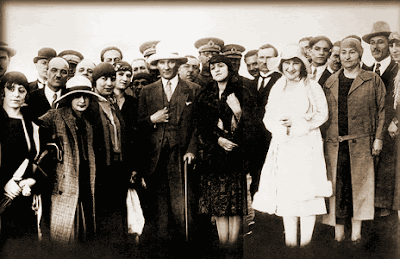Prego..
The story of our Republic ...
After the Ottoman Empire had been defeated at World War I, it collapsed and the invaders occupied Anatolia. Mustafa Kemal Atatürk ( † 1938) led the War of Independence from 1920 till 1922, totally liberating Anatolia from the invaders and on 29 October 1923 established the Republic of Turkey. Atatürk was elected as the first President of the Turkish Republic and the modern state of Turkey was therefore born.
Mustafa Kemal Atatürk who was born in 1881 in Salonika, founded the modern Turkish Republic. He created a brand new nation, a new country and a secular state with his modern and enlightened way of thinking and his view of life.
Turkish Republic was founded on six basic principles: republicanism, nationalism, populism, secularism, statism and revolutionism. These fundamental principles of Atatürk, guide the Turkish Republic and they are written in the Constitution.
Republicanism emphasizes that the sovereignty is vested not in a single ruler but in the nation. In fact Atatürk established a new government truly representative of the nation’s will and said: “Sovereignty Belongs Unconditionally To The People”.
As for the principle of Nationalism, it symbolizes the independence of the Republic of Turkey. This nationalism is not racist, on the contrary it is a nationalism which respects the independence right of all other nations.
Populism emphasizes the necessity of the equal rights of each Turkish citizen regardless of sex, race, religion. The Grand National Assembly should represent all economic and social rights of all the Turkish citizens. And the state should be governed by persons elected by the public itself.
Secularism means the separation of religion from the State; primarily from educational and legal affairs.
Statism means the state’s intervention and control in the main sectors of economy, the aim of which was the assurance of rapid economic development.
Revolutionism is considered to be one of Atatürk’s most important principles. The modern concepts had to be adopted as rapidly as possible.
The right to vote and to be elected within the Parliament was given to women, thus Turkish women granted the same rights as men did. Polygamy was abolished and civil marriage was introduced. The equal rights of women in divorce, custody, and inheritance were recognized by the new Civil Code. Back then, Turkey had the world's first female Supreme Court judge.
Besides, Western calender, International numeric system and the Metric system were introduced. The Roman alphabet was accepted and Turkish Language Institution and Turkish History Institution were founded. Old taxation laws were abolished and the farmers were encouraged, model farms and industrial corporations were established. In fact Atatürk underlined the importance of the farmers by saying: “The True Owner And Master Of Turkey Is The Peasant Who Is The Real Producer.”
In accordance with the new surname law, in 1934 when everyone had to take a surname, the Turkish Grand National Assembly gave him the surname Atatürk, which means “Father of the Turks”.
On November 10, 1938, following an illness of a few months, the Father of modern Turkey died. But his legacy to the Turkish youth and to the world endures. Today his mausoleum “Anıtkabir” located on a hill overlooking Ankara, is visited by all visiting foreign dignitaries and all Turkish citizens wishing to pay their respects to their founding father and national liberator.
Atatürk left the legacy of enlightenment and humanism to the Turkish youth.
His words “Peace At Home, Peace In The World” has been proven to be the best policy for every nation and society.










No comments:
Post a Comment